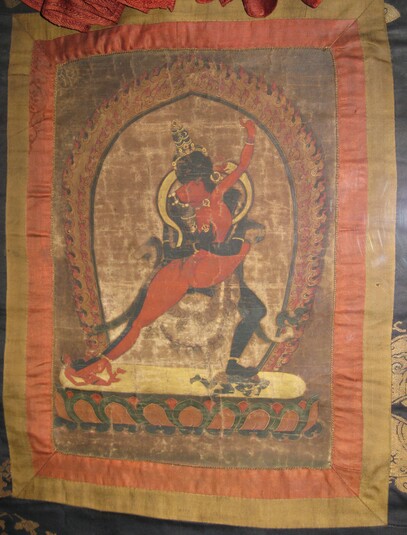
Item: Chakrasamvara (Buddhist Deity) - Sahaja Heruka
| Origin Location | Tibet |
|---|---|
| Date Range | 1700 - 1799 |
| Lineages | Buddhist |
| Material | Ground Mineral Pigment on Cotton |
| Collection | Rubin Museum of Art |
Classification: Deity
Appearance: Semi-Peaceful
Gender: Male
Chakrasamvara Sahaja Heruka (Tibetan: khor lo dem chog. English: Wheel of Supreme Bliss): the foremost meditational deity of the Wisdom-mother classification of Anuttarayoga Tantra of Tantric Buddhism. An inscription on the back states that the painting was done by a Chokyi Nangwa. This most likely refers to Kunzing Chokyi Nangwa, the 8th Drugchen of the Drugpa Kagyu tradition of Tibetan Buddhism. He was also known as an artist and a number of Tibetan paintings from this period of time are inscribed with the name Chokyi Nangwa or Kunzig Chokyi Nangwa.
Tibetan: Khor lo dem chog
"Chakrasamvara, blue in colour, the right foot is extended pressing on red Kalaratri and the left drawn in [pressing] on black Bhairava. With one face and two hands, three eyes, the right hand holds a vajra and the left a bell; embracing the consort, with a crown of five dry human heads as a crown, a necklace of fifty wet, and adorned with the six bone ornaments. [Chakrasamvara is] embraced by the consort Vajravarahi, red in colour, with one face and two hands. The right hand holds a curved knife pointed to the ten directions. The left holds a skullcup filled with the five nectars and embraces the Father. [She is] adorned with a crown of five dry human heads, a [necklace] of fifty dry [heads] and the five bone ornaments." (Jamyang Kyentse Wangpo, 1820-1892).
The meditational deity Chakrasamvara is common to all the New Schools of Himalayan and Tibetan Buddhism (Sarma: Sakya, Kagyu and Gelug). Within the Gelug School the deity is commonly referred to as Heruka. Among the many different forms and mandalas of practice, this form with one face and two hands entered Tibet with the great translator Rinchen Zangpo in the 11th century.
Jeff Watt 2-2009 [Text 9-2006]
Front of Painting
English Translation of Inscription: [No apparent inscriptions]
Reverse of Painting
English Translation of Inscription:
Glorious teacher, great Heruka,
Great bliss Father-mother con-joined,
Protect always in successive lives;
May I always practice the Vajrayana.
(This scroll painting was drawn by Chokyi Nangwa during free time).
Wylie Transliteration of Inscription: bla ma dpal chen he ru ka/ yab yum mnyam sbyor bde ba che/ tshe rabs rtag tu skyong ba dang/ rdo rje theg pa spyod gyur cig/ che pa'i bris thang 'di chos kyi snang bas rnam g.yeng bar gseng la bris/.
Special Features: (Cursive script (Umay), is black)
Buddhist Deity: Chakrasamvara, Heruka (Couple, Painting)
Collection of RMA: Historically Important Works
Painting Style: Minimalist (Drugpa Kagyu, Lhatog)
Buddhist Deity: Chakrasamvara Main Page
Collection of Rubin Museum of Art: Painting Gallery 4
Buddhist Deity: Chakrasamvara, Heruka
Artist: Kunzig Chokyi Nangwa
Subject: Name Inscription - Misidentified or Name Added

